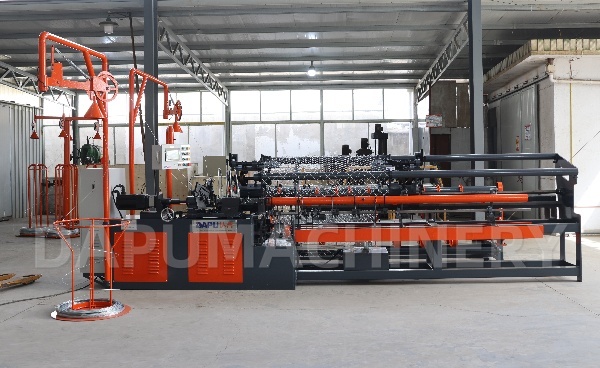
Top 5 Chain Link Fencing Machines for High-Speed Production in 2024
Category:News
Author:
Source:
Add time:2025-04-24 11:35
In 2024, the demand for chain link fencing continues to surge across emerging markets like South America. These regions prioritize machines that deliver speed, durability, and adaptability to local challenges, from harsh climates to infrastructure demands. For businesses aiming to dominate these markets, selecting the right fencing machine is critical. Below, we explore the top 5 chain link fencing machines tailored to address regional pain points, with a focus on DAPU’s innovative solutions.

1. DAPU DP 25-85 Single-Wire Feed Machine: Ideal for High-Volume Projects
Target Markets: South America, Africa
Key Features:
Wire Diameter: 1.8–4 mm
Mesh Opening: 25–85 mm
Maximum Width: 4,000 mm
Production Capacity: 120–180 m²/h
Why It Stands Out:
In regions like South America and Africa, where agricultural and industrial projects require rapid deployment, the DP 25-85 shines with its high-speed output. Its ability to process thicker wires (up to 4 mm) ensures durability for fencing in rugged terrains or wildlife-prone areas. For example, Brazilian farms battling livestock breaches benefit from its sturdy galvanized wire compatibility. Additionally, the machine’s adjustable mesh length allows customization for varying project scales, reducing material waste—a crucial factor for cost-sensitive markets.
2. DAPU DP 20-100 Double-Wire Feed Machine: Perfect for Large-Scale Infrastructure
Target Markets: Middle East, Southeast Asia
Key Features:
Wire Diameter: 1.6–4 mm
Mesh Opening: 25–100 mm
Maximum Width: 6,000 mm
Production Capacity: 70–100 m²/h
Why It Stands Out:
The Middle East’s mega-construction projects and Southeast Asia’s expanding urban zones demand extra-wide fencing for highways, airports, and security perimeters. The DP 20-100 addresses this with a 6,000 mm maximum width, minimizing joints and installation time. Its dual-wire feed system enhances structural integrity, ideal for Saudi Arabian solar farms requiring wind-resistant barriers. Meanwhile, in Indonesia’s humid climate, the machine’s compatibility with PVC-coated wires prevents rust, extending fence lifespan.
3. DAPU DP 20-100P Dual-Motor Double-Wire Feed Machine: Power Meets Flexibility
Target Markets: Africa, Remote Areas
Key Features:
Wire Diameter: 1.5–4.5 mm
Mesh Opening: 25–100 mm
Production Capacity: 80–260 m²/h
Why It Stands Out:
Africa’s unreliable power grids and remote worksites require machines that perform under pressure. The DP 20-100P’s dual-motor design ensures stable operation even with voltage fluctuations, a common issue in Nigeria or Kenya. Its unmatched capacity range (80–260 m²/h) suits both small rural projects and large mining site enclosures. For example, Tanzanian contractors can switch between low-carbon steel for cost efficiency and high-tensile wires for security fencing—all on the same machine.
4. Customizable Solutions: Adapting to Local Needs
Target Markets: All Regions
DAPU’s machines stand out for their customization options. Users can request adjustments to wire diameter, mesh openings, and widths to meet specific requirements. In Southeast Asia, where land topography varies widely, contractors in Thailand or Vietnam tailor fences for sloping terrains. Similarly, Middle Eastern clients often request tighter mesh openings (25 mm) for anti-intrusion barriers. This flexibility eliminates the need for multiple machines, saving costs for budget-conscious buyers.
5. Multi-Material Compatibility: Fighting Corrosion & Cutting Costs
Target Markets: Coastal Regions, High-Humidity Zones
Machines that only handle basic materials fail in corrosive environments. DAPU’s models support galvanized, PVC-coated, and low-carbon steel wires, making them ideal for coastal areas in Peru or monsoon-heavy Philippines. PVC-coated wires resist saltwater corrosion, while galvanized options offer affordability for African markets. This versatility lets businesses diversify their product lines—e.g., offering decorative fencing in Dubai’s luxury resorts or heavy-duty barriers for South African game reserves.
Regional Pain Points & How DAPU Machines Solve Them
Power Instability (Africa): Dual-motor systems ensure uninterrupted production.
Harsh Climates (Middle East/Southeast Asia): Corrosion-resistant materials extend product life.
Diverse Project Scales (South America): Adjustable settings reduce waste.
Budget Constraints (All Regions): High-speed output lowers labor costs.
Custom Demands (Urban/Rural): Tailored designs meet specific needs.
Conclusion
For 2024, DAPU’s chain link fencing machines offer a competitive edge in high-growth markets. Whether it’s the high-speed DP 25-85 for Brazilian farms, the rugged DP 20-100P for African mines, or customizable options for Southeast Asia’s unique needs, these machines tackle regional challenges head-on. By prioritizing adaptability, durability, and efficiency, businesses can capitalize on infrastructure booms while keeping costs in check.
Ready to boost your fencing production? Contact DAPU today to design a machine that aligns with your market’s demands.
Recommend News




